Substitute for Beard Oil
You can effectively substitute commercial beard oil with several natural alternatives that provide similar benefits. Coconut oil offers excellent moisturizing and antibacterial properties, while argan oil's high vitamin E content fights dandruff and promotes healthier growth. Jojoba oil closely mimics your skin's natural oils, making it an ideal choice for balanced hydration. For a growth-focused option, try pumpkin seed oil, which can boost hair growth by up to 30%. You'll want to apply your chosen oil to a slightly damp beard, using 2-3 drops for shorter beards or 6+ drops for longer ones. Understanding the specific properties of each alternative will help you make the best choice for your beard care routine.
This post may contain affiliate links. If you make a purchase through these links, I may earn a commission at no additional cost to you. Additionally, portions of this post may be generated using artificial intelligence (AI) technology. While we strive for accuracy, please be aware that AI-generated content may not always be perfect and should be fact-checked when necessary.
The Spatula Scoops
- Coconut oil provides excellent moisturizing and antibacterial properties while promoting thicker beard growth and preventing hair breakage.
- Argan oil's high vitamin E content fights beard itch and dandruff while delivering long-lasting hydration and improved texture.
- Jojoba oil closely mimics natural skin oils, making it an ideal beard oil substitute for balanced moisture and environmental protection.
- Mix essential oils like tea tree or rosemary with carrier oils for a customized beard treatment that promotes growth and health.
- Castor oil specifically targets patchy beards by strengthening hair follicles and encouraging new growth in sparse areas.
Natural Beard Oil Alternatives
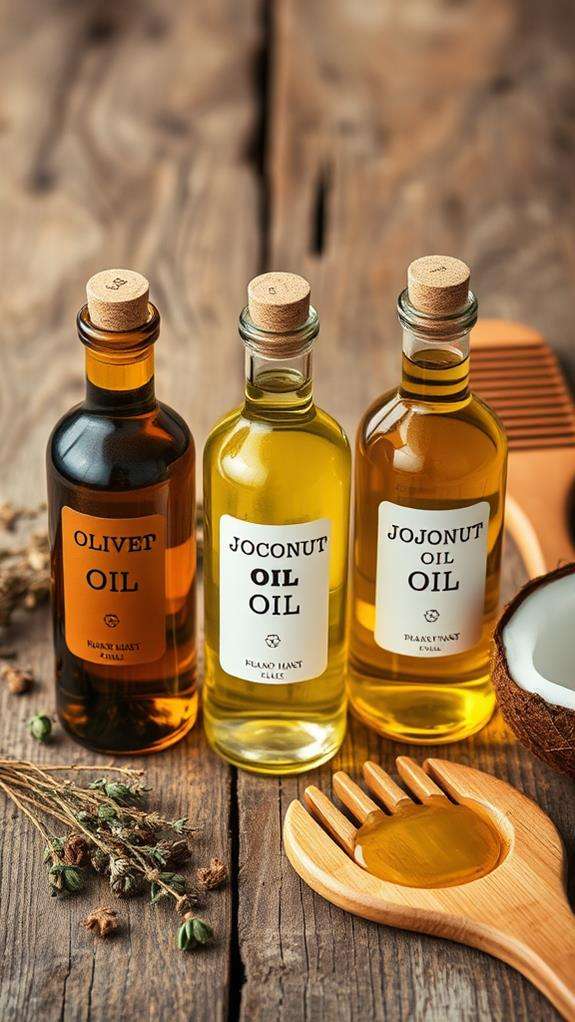
When it comes to maintaining a healthy beard, natural oils can effectively replace commercial beard oils while providing excellent nourishment and care. Several natural carrier oils serve as an outstanding beard oil substitute, each offering unique benefits for your facial hair and skin underneath.
You'll find that coconut oil stands out as a powerful moisturizer with antibacterial properties, helping you achieve thicker growth while preventing breakage. If you're dealing with beard itch or dandruff, argan oil's vitamin E content makes it an excellent choice, providing long-lasting hydration and improving your beard's texture. Jojoba oil, which closely resembles your skin's natural oils, works wonderfully to maintain moisture balance and protect against environmental damage.
For those focused on growth, pumpkin seed oil deserves your attention, as it can boost hair growth by up to 30% while maintaining essential moisture. When you need extra control along with moisturizing properties, consider using beard balms, which combine these beneficial oils with waxes. This combination provides both nourishment and styling capabilities, making it particularly effective for longer, more unruly beards that require additional maintenance.
Commercial Beard Care Products
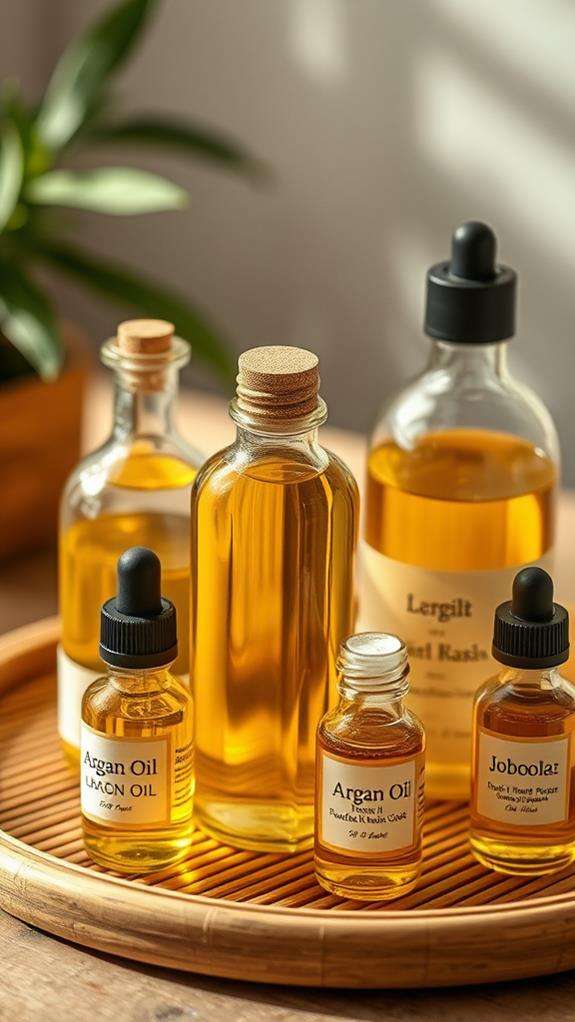
While natural alternatives offer excellent benefits, commercial beard care products provide specialized formulations designed for specific beard needs. When you're seeking a beard oil alternative, you'll find that commercial options like beard balms and serums contain carefully balanced combinations of nourishing oils and essential oils that target multiple aspects of beard growth and maintenance.
If you're dealing with an unruly beard, commercial products offer these distinct advantages:
- Beard balms provide superior hold while moisturizing the skin underneath
- Specialized serums deliver concentrated hydrating properties without greasiness
- Premium formulations include vitamin-rich ingredients that support facial hair health
- Regular use leads to improved manageability and reduced itchiness
The commercial beard care products market has evolved to address specific concerns you might face with your facial hair. While these products often come with a higher price tag, their specialized formulations can justify the cost. You'll find that beard balms, in particular, excel at providing both styling control and moisturization. The combination of butters, waxes, and nourishing oils creates a product that's especially effective for longer beards that require extra attention.
Application Techniques and Tips
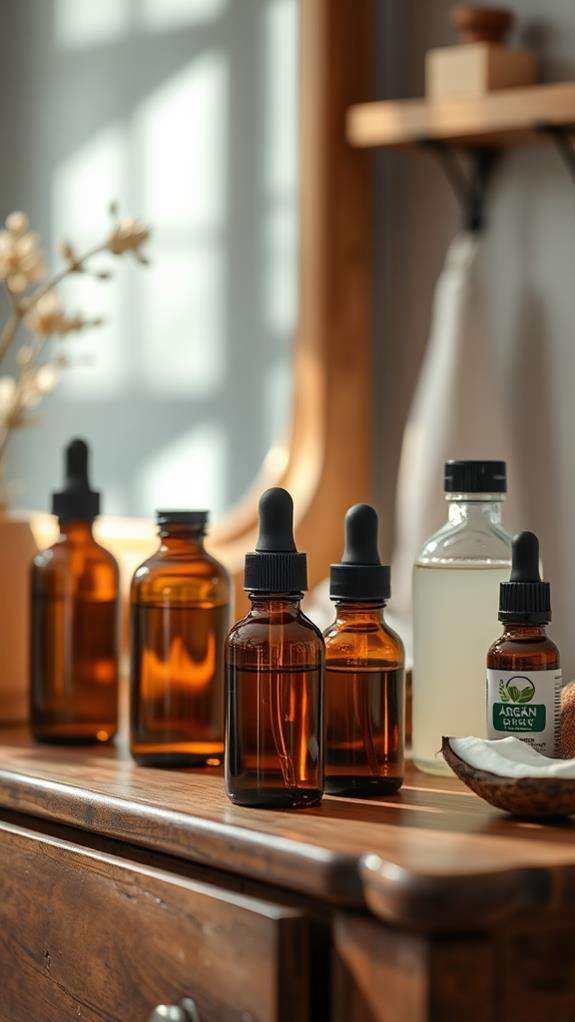
Proper application techniques can make the difference between a well-groomed beard and a messy one. Whether you're using natural ingredients or essential oils as substitutes for traditional beard care products, it's vital to start with a clean foundation. Begin by washing your beard with a specialized cleanser and patting it until it's slightly damp.
You'll want to adjust the amount of your chosen oil based on your beard's length. If you've got a short beard, 2-3 drops will suffice, while longer beards might need 6 or more drops for best coverage. Here's a pro tip: warming the oil in your palms before application helps with absorption and makes massaging easier. Start at the roots, working the oil down to the tips while ensuring you're reaching the skin underneath to prevent dry skin and irritation.
For maximum moisture retention, apply your chosen substitute when your beard is slightly damp rather than completely dry. You'll need to maintain a regular application schedule – if you've got dry hair, apply once or twice daily, while those with normal hair can stick to 4-5 applications per week.
Essential Oils for Beard Health
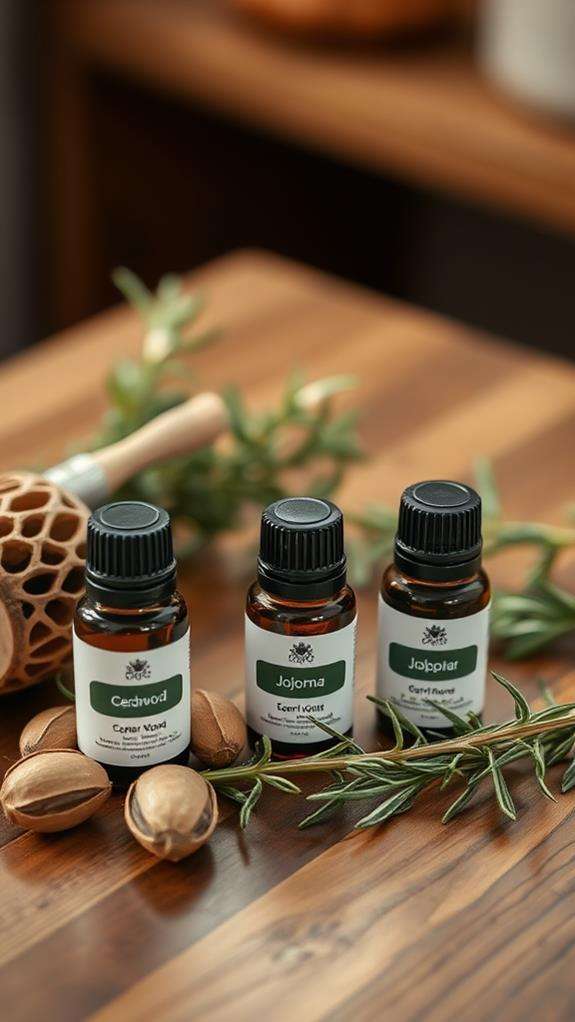
Through the power of essential oils, you'll find a natural and effective way to enhance your beard's health and appearance. When you're looking for a substitute for traditional beard oil, essential oils for beard health offer remarkable benefits, especially when properly mixed with carrier oils. By combining these powerful natural ingredients, you'll create a personalized solution that promotes healthy beard growth while maintaining ideal skin condition.
For maximum effectiveness, follow these key guidelines when using essential oils in your beard care routines:
- Always dilute essential oils with carrier oils like jojoba oil at a ratio of 1-2 drops per teaspoon
- Choose skin-friendly options such as tea tree, cedarwood, or lavender for their antibacterial properties
- Include rosemary oil to stimulate hair follicles and promote growth
- Mix with argan or coconut oil for enhanced moisturizing effects
If you have sensitive skin, start with a more diluted mixture and gradually increase the concentration as your skin adjusts. The combination of essential oils and carrier oils won't just improve your beard's appearance – it'll also help reduce itchiness and flakiness while providing natural nourishment to both hair and underlying skin.
Choosing the Right Substitute
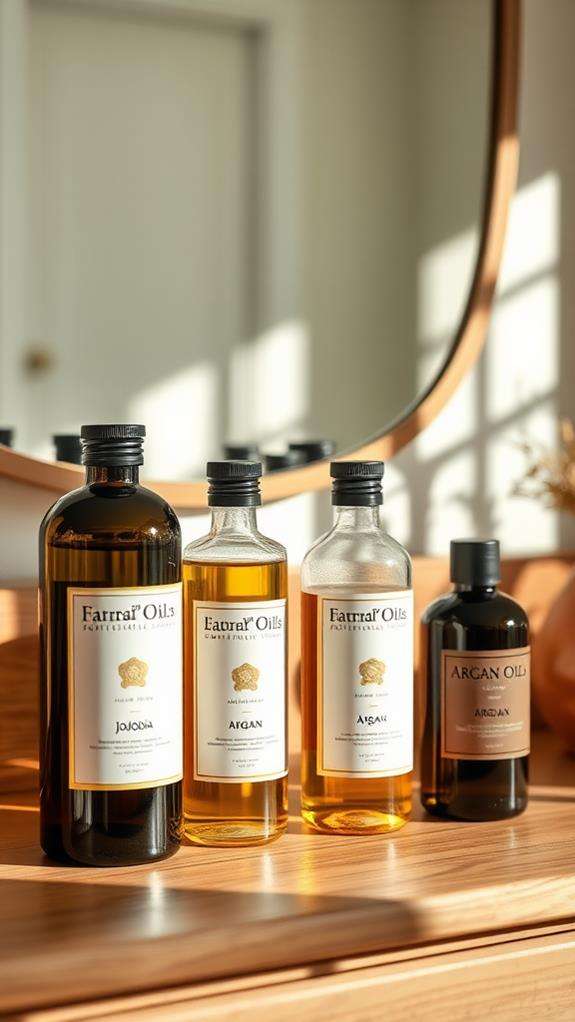
Success in finding the perfect beard oil substitute depends on understanding your specific needs and skin type. When you're looking for a natural substitute for beard oil, you'll find several effective options that can match or even exceed traditional beard oil's benefits.
If you're dealing with dry, brittle hair, coconut oil's moisturizing properties make it an excellent choice, while its antibacterial qualities help maintain a healthy beard environment. For those focused on hair growth and hydration, argan oil's high vitamin E content delivers impressive results, particularly in combating dandruff and promoting stronger strands. When you want to avoid greasy residue, consider jojoba oil, which mimics your skin's natural oils and absorbs quickly into both hair and skin.
For addressing a patchy beard, you'll find castor oil particularly beneficial, as it strengthens hair follicles and encourages new growth. If you're managing a longer or unruly beard, beard balm offers a dual advantage: it provides essential moisturizing benefits while helping you maintain control over your facial hair's appearance through its wax content.
Frequently Asked Questions
What Else Can I Use Instead of Beard Oil?
Your beard will thank you with a million happy dances when you try these fantastic alternatives! You can use coconut oil for deep moisturizing and antibacterial benefits, argan oil for its vitamin E richness and itch control, jojoba oil to mimic your skin's natural oils, or castor oil to boost growth in patchy areas. For longer beards, you'll love beard balm's combination of waxes and natural oils that'll tame even the wildest facial hair.
What Can Be Used as a Beard Oil?
You can effectively use several natural oils as beard oil alternatives. Coconut oil will moisturize and soften your facial hair while preventing breakage. Argan oil's vitamin E content helps with hydration and reduces itching. Jojoba oil's similarity to your skin's natural oils makes it perfect for beard care. Castor oil strengthens follicles and may help with patchiness, while pumpkin seed oil can boost hair growth by up to 30%.
How Can I Take Care of My Beard Without Beard Oil?
Studies show that 55% of men experience beard-related skin issues when not using proper care routines. You can maintain a healthy beard by cleansing regularly with specialized beard wash, applying natural moisturizers like coconut or jojoba oil, and incorporating beard balm for styling. Don't forget to trim regularly to prevent split ends, and consider making your own care blend using carrier oils mixed with essential oils like tea tree or rosemary.
Can Olive Oil Replace Beard Oil?
Yes, you can effectively use olive oil as a beard oil replacement. It's rich in squalane and vitamin E, which help promote beard growth and maintain moisture. You'll want to apply 3-5 drops for shorter beards or up to 10 drops for longer ones. As a non-comedogenic oil, it won't clog your pores, and it'll help reduce itching and dandruff. Just massage it evenly through your beard for the best results.





